- Home
- Chris Ryan
Killing for the Company Page 18
Killing for the Company Read online
Page 18
The flat had three rooms: a living space with a small kitchenette; a bedroom with a large double bed, a dressing table, an armchair and a standard lamp; and a tiny bathroom. There were no personal possessions here, nothing that would ever give a clue as to who occupied it and certainly nothing to suggest that it was a woman. No soft furnishings or items of comfort. Just what was necessary. Even the drawer full of make-up in her dressing table was a tool, and once she was inside, Maya headed straight for the bedroom and opened it.
Lipstick. Mascara. Perfume. Sometimes these weapons were as formidable as any gun, and she needed to apply them with care.
First, however, she showered, washing away the dirt of last night’s job with a tub of Swarfega she kept for that purpose. She noticed a spattering of blood on the inside of her wrist, and remembered bludgeoning the wound of her victim the previous night. It was difficult to scrub off, but soon her flesh was clean. She stepped out of the shower, quickly dried her skin and her hair, then returned to the bedroom. She sat naked at the dressing table, where she powdered her aching cheek so that the swelling was less visible, before fixing her make-up and applying a squirt of perfume to the top of her pale breasts.
The clothes she chose from her wardrobe left little to the imagination. Black hold-ups. Lace underwear. No bra, but a short white dressing gown with two pockets. Once she had done it up, she returned to her dressing table and opened an empty drawer. It had a false bottom, which she removed to reveal her small stash of weaponry. Rounds for her Beretta, a 9mm snubnose and a small knife. She took the snubnose and the knife, and placed one in each pocket of her dressing gown. Having replaced the bottom of the drawer, she took a seat in her bedroom armchair.
And here she waited.
As she waited, she thought. Of Amit, of her parents and of the past. And when those thoughts became too much for her to bear, she thought of the future. All her adult life had been devoted to the Institute, from the day she had been admitted into the training academy until today. Now, of course, was when it ended. She had her own battles to fight. If Mossad wouldn’t help her wage war on the Arabs, she would have to do it herself.
Time passed. The day slipped away and darkness crept into Maya’s flat. She switched on the standard lamp by her armchair and continued to wait. She knew Ephraim Cohen’s methods well. She had carried out his instructions often enough, after all. He would send someone today. If a job needed to be done, it needed to be done quickly. And if she refused to leave this flat, they would have to come to her. That meant she was in control, no matter what anybody else thought.
She heard the first noise a little before ten o’clock. It was very quiet, barely louder than the beating of her heart: the sound of the lock on the street door being picked. She loosened the dressing gown around her cleavage, then slipped her right hand into the pocket containing the snubnose and pointed it through the flimsy material of her gown, towards the door of her bedroom. Perhaps she would need the weapon instantly, but she hoped not. The noise would attract attention.
And besides, Maya Bloom had other plans for her expected, but unknown, guest.
She didn’t hear footsteps coming up the stairs, but then she wouldn’t have expected to. Any hitman worth the name should be able to tread quietly. The first she saw of him was his weapon, a suppressed handgun peeking round the corner of the door as it slowly opened to reveal a shadowy figure silhouetted in the frame.
Silence.
Her finger slowly caressed the trigger of her weapon.
‘Who are you?’ she whispered, injecting a note of fear into her voice. ‘How did you get into my . . . ?’
‘Shut up.’
The figure stepped into the room. Maya saw a young man, perhaps in his mid-twenties, with black hair and stubble on his face. His voice had a cockney twang. She examined his weapon. A matt-black Glock, safe-action trigger.
‘Please,’ Maya whispered. ‘Don’t hurt me. I’ll do what you want . . .’
The young man took another couple of steps towards her.
‘Please,’ she said. ‘I’ll do anything . . .’ She kept the hidden gun pointing directly at him, ready to shoot at the slightest hint that he was going to use his.
He eyed her up and down. Maya understood the look. She understood that he was already hers.
Feigning timidity, she stood up. Her dressing gown was tied sufficiently loosely for her breasts to be exposed, and she saw the newcomer appreciating the sight. She understood assassins, understood their love of danger and of risk-taking, and that they were devoid of principle. And she understood men too. She knew what was going through this one’s head: that he was going to kill her anyway, so he might as well have her beforehand. It didn’t matter how good they were, they always thought with their dick first and their head second. It was one of the first things she’d learned during her training, and she’d used that knowledge more times than she could remember.
‘Get over to the bed,’ he instructed. ‘Lie down. Maybe I’ll let you live.’ The arrogance, she thought. This was why women made better killers than men.
Maya released the grip on her snubnose – she wouldn’t be needing it now. She was safe as long as this man’s sexual energy remained unspent. She did as she was told, positioning herself so that her knees were bent at the end of the mattress, her feet on the ground and legs slightly open. The man towered above her, lasciviously taking in the sight, then bent down and roughly yanked her knees apart. She felt the cold butt of his weapon being pressed into her right thigh at the same time as she felt herself being exposed by two rough fingers pulling her underwear to one side. And when she felt his tongue inside her, she gasped – feigning the arousal she never felt.
She let him continue for about ten seconds before slowly moving her left hand down to the pocket containing her knife. She moaned as she removed it, just to keep him interested.
‘You like that, huh?’ she heard him say, like some boorish stud in a porno flick.
‘Yeah,’ Maya replied in kind. She’d studied the movies, and she knew what guys liked to hear. But as she spoke, she raised her arm above her head. ‘Yeah, I like that . . .’
It was a single movement. She used the strength in her stomach muscles to sit up at the same time as she brought the knife arm down with all the force she had. The thin blade slammed into the back of the man’s neck with absolute ease, and with a second sudden movement, she pushed his head with her free hand so that he rolled on to his back. As she stood up, she saw his limbs twitching violently; his tongue, which just seconds before had been so busy, was still peeking out from his lips, surrounded by blood. It looked to Maya as though he had involuntarily bitten into it.
It took him about a minute to die. A minute during which a thick pool of blood seeped from the back of his neck and the twitching of his limbs receded into nothingness. Maya watched it happen, standing above her victim semi-clad and with a flat, dispassionate look in her eyes.
His death, she decided, once the corpse was still, was not enough. Her usual habit was to make things look like an accident, but tonight she had a different intention. She tightened her dressing-gown cord, then bent down and hauled his body on to the bed, ignoring the blood that smeared her hands, her feet and her gown. She rolled him on to his front, pulled out the knife and rolled him back again, before going about the awkward business of undressing him. In the end she found herself cutting strips of material away with the knife. Occasionally she scored the skin, but that hardly mattered now. Her victim was about to look a whole sight worse.
Once he was fully naked, she stepped back and examined him. One cut would do it, from the throat, down his abdomen, to the area just above his groin. The knife pierced the skin easily. With the precision of a butcher she sliced his body open in a single movement. Blood seeped from the incision, though not a great deal because his heart was no longer beating. Maya discarded the knife – it had done its work – and then slipped her fingertips into the incision in the belly and ripped the skin apar
t.
There was a sucking sound as the warm internal organs loosened and spilled out, bringing with them a terrible, rancid smell. The end result was monstrous and Maya, even though her stomach was turned only by the stink and not by the sight, recognised this. She went back to the bathroom for her second shower of the day, leaving bloodied footprints in the carpet as she went.
This time the blood took longer to clean from her skin. The shower ran cold, but she stayed there until the water spiralling around the plughole was no longer pink. When she stepped out, she was covered in goosebumps, so she dried quickly and put on a clean set of clothes, barely glancing at the mutilated corpse on her bed.
It was time to leave. There was nothing she wanted to take with her, except the snubnose, the Beretta and the extra rounds. She would never be returning to this place. She allowed herself one final look at her handiwork. Did it say what she wanted it to say? Did it warn Ephraim Cohen, and the others at the Institute, what would happen to anybody they sent after her?
‘Ken behekhlet,’ she muttered to herself. ‘Damn right it did.’
Maya Bloom walked out of the bedroom, descended the stairs and stepped out into the cold night air, closing the front door quietly behind her.
PART THREE
Ten years later, 2013.
FIFTEEN
5 December.
Reg Parker, the driver of the soon-to-depart 16.55 train from Bristol Parkway to London Paddington, was deeply engrossed in his Daily Express. He had a thing for Kate Middleton and was glad to be alone in the driver’s compartment to lech over the double-page spread plastered with paparazzi shots of her on a beach in Antigua. No sign in the pictures of that chinless wonder Wills, thank God. Just Kate, the sea, the sand and, in his imagination, Reg himself – rubbing factor eight into her back. He looked up in irritation when he heard a tap on the platform-side window.
Some bloody foreigner was standing there, grinning like an idiot. He wore a baseball cap and dark glasses, so Reg couldn’t tell what nationality he might be. Chink, perhaps? He had a camera round his neck, so Reg reckoned he was a trainspotter. Bloody weirdos, the lot of them. He shook his head with irritation, pointed back towards the passenger carriages and went back to his paper.
But the trainspotter didn’t give up. He tapped louder. Reg, irritated now, threw Kate and her sun-kissed skin to one side, and lowered the window.
‘Look, mate, you need to step back from the . . .’ he said.
He drew breath rapidly. The trainspotter wasn’t smiling any more. And he obviously wasn’t a trainspotter either. As soon as Reg had dropped the window he’d stuck his right hand through the opening. He was holding a gun.
‘You’ve got five seconds to open up.’ The gunman’s accent was heavy and unknown to Reg, who started to tremble.
‘Three seconds.’
Reg fumbled desperately as he opened the driver’s door. The gunman stepped in immediately, pulled the door shut and slid down, with his back against the lower section of the door so he couldn’t be seen from outside.
‘Raise the alarm,’ he said, ‘and I’ll kill you. Do anything except drive off on time and I’ll kill you.’
Reg swallowed hard. He didn’t reply. He couldn’t do anything but stare, petrified, at the weapon in the foreigner’s fist. His own fist scrunched Kate Middleton’s midriff. He was weak with fear and not altogether sure that he wasn’t about to piss himself.
It had puzzled Hussam Hayek, in the weeks leading up to this moment, that trains were not more common targets. Yes, to bring down an aircraft was dramatic. But trains were easy to board and had none of the security restrictions that came with air travel. Unless you were unfortunate enough to encounter a sniffer dog, you’d be practically untraceable on any railway station in the world. And once the train was in motion and between stations, there was little anybody could do to stop you.
The 16.55 to Paddington was in motion and between stations now. One of Hussam’s accomplices, if everything had gone according to plan, had the driver under his control. Surely there was no way anybody could prevent this from happening now.
The train’s five carriages held about thirty passengers each. Men in grey suits and cheap shoes making the journey up to town sat alongside pensioners, mums and a few schoolkids. One blind man had his guide dog sitting in the aisle by his side, his white stick lying at an angle on the table in front of him. The guard had announced just a minute after the train had left the station that no refreshments would be served on this journey, before warning the passengers to be on the lookout for unattended bags or suspicious packages. Hardly anybody listened. They were too wrapped up in their own activities: doing sudokus, texting, listening to iPods.
In addition to the young man who had the driver at gunpoint, there were four accomplices, all male, all nervous, all sweating. Their clean-shaven skin was dark and their eyes brown, but it would be difficult for anyone to tell that they were lifelong residents not of Bristol, nor of London, but of Gaza, that long, thin strip of land sandwiched between Israel, Egypt and the deep blue of the Mediterranean. War-torn. Blood-spattered. Bomb-shattered. Hell by the sea.
Of these four men, Hussam and one other stood at the end of the front carriage, next to the toilets; the other two stood in the same position at the opposite end of the train. All four had known tragedy. Two were orphans before they reached the age of ten, their parents killed by Israeli bombs launched into Gaza from screaming F-16s on the pretext of self-defence. A third had more physical scars: the side of his body bore the lurid traces of a mess of inexpert stitching where a piece of shrapnel had entered. It had been removed, and the wound repaired, without the luxury of anaesthetic or painkillers. He still carried pain with him every waking second, and it was even worse when he tried to piss.
Hussam Hayek was a little older than the other three and they looked to him as a leader on account of this. Two years ago he had become a father, but he only remained so for three days. His wife and baby son had died within an hour of each other – she for want of antibiotics, he for reasons overworked doctors couldn’t fathom. The child’s death was not a surprise to anyone. It was just the way things were in Gaza, its borders blockaded, the importation of medicines strictly controlled. Some entered the country via a smugglers’ route – the subterranean tunnels that ran under the border with Egypt – but these were a precious commodity and never found their way into the hands of poor men like Hussam Hayek.
Small wonder, then, that these four, like many before them, were radicalised beyond the point of return. That hatred was in their DNA. They had nothing to live for.
But they had everything to die for.
Hussam was wearing a Red Hot Chili Peppers baseball cap he’d bought just the day before because he thought it made him look more Western. The rest of their clothes were loose-fitting, but this wasn’t a fashion statement. Beneath their T-shirts and M&S raincoats, each man wore a vest packed with acetone peroxide, or TATP. It was a relatively simple explosive to make – all you needed was drain cleaner, bleach and acetone – but the end result was extremely volatile. In Gaza, you could always recognise the TATP engineers. They were the men with missing fingers.
Some people called this crystalline white powder Mother of Satan: a good name, because it was indeed capable of giving birth to the diabolical. Hussam Hayek smiled to himself. It wouldn’t be long before the whole world took notice of Gaza.
As fields and woodland sped past, Hussam fiddled somewhat absent-mindedly with the small switch attached to a wire peeking out from below his left sleeve. All four men wore the same set-up. It was already dark outside, and he could see his anxious reflection in the glass of the side door. He felt weak with nerves. He hadn’t expected to. In the days leading up to today there had been a sense of anticipation. Of excitement almost. He’d hoped to feel that excitement now. He was, after all, to be reunited with his loved ones in just a few minutes. But his skin was soaked in sweat and his hand trembled. What if it went wrong? What if
somebody stopped them before the critical moment?
He leaned as nonchalantly as he could against a small poster warning that CCTV was operating on this train and looked at his watch. 17.11 hrs. Six minutes until they started.
Six minutes until paradise.
It was crucial to wait. Their controller had been most emphatic about that when handing out their weapons and ammunition and explaining the details of their evening’s mission. At 17.17 precisely the train would be equidistant from the two stations furthest apart on their route. That was the prime spot – far away from any possibility of interference. And there were other reasons for waiting until that exact moment, too. This was just one of a series of coordinated events, all planned to take place at the same time. Hussam Hayek and his team didn’t know the details – it was better that way – but they knew they were part of something big.
Like, 9/11 big.
17.13. Hussam glanced at his partner. The kid was sweating too as the movement of the train jolted his thin body rhythmically up and down.
Up and down.
Up and down.
Time check. 17.14. One of the passengers – a pregnant woman who was clearly almost at term – waddled along the aisle and into the toilet. Hussam felt another trickle of sweat down the nape of his neck.
The train jolted.
Up and down.
Up and down.
It brought back a game his father had played with him as a toddler, bouncing him up and down on his knee. His companion glanced at his watch. Hussam did the same. 17.16. One minute to go.
The two men removed the rucksacks from their backs. Hussam fished inside his with his right hand. He felt very comfortable with the weapon that his fingers touched. They’d already spent a long time firing them, as well as practising how to change the magazine swiftly. ‘AKS-74U,’ they’d been told. Hussam knew a little about guns. He knew that these were shortened variants of the standard 74, somewhere between a submachine gun and an assault rifle. Ideal for close-quarters combat, and for keeping concealed. They had probably been made in the old Soviet Union. How they had made the journey from there to the rucksacks of Hussam’s team was anybody’s guess, but it wasn’t important now: they were coming to the end of their lives.

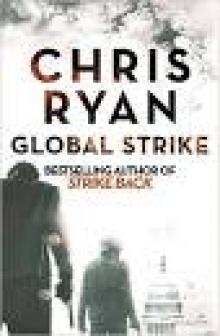 Global Strike
Global Strike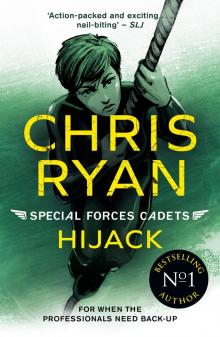 Hijack
Hijack Special Forces Cadets 2
Special Forces Cadets 2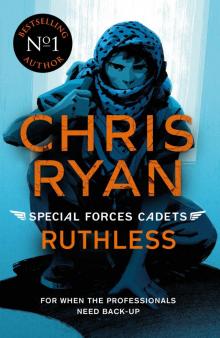 Ruthless
Ruthless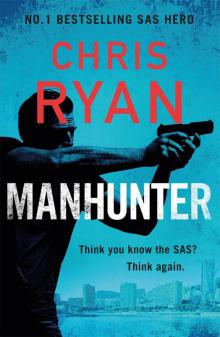 Manhunter
Manhunter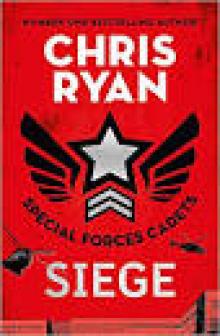 Special Forces Cadets 1
Special Forces Cadets 1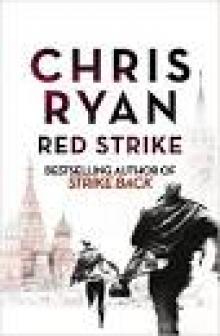 Red Strike
Red Strike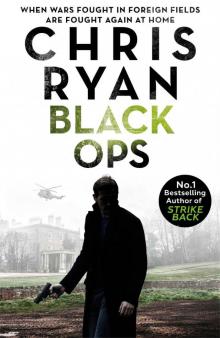 Black Ops
Black Ops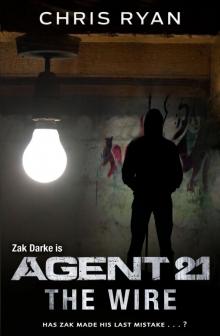 Agent 21: The Wire
Agent 21: The Wire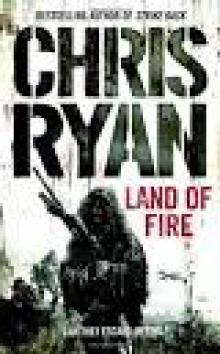 Land of Fire
Land of Fire Alpha Force: Fault Line
Alpha Force: Fault Line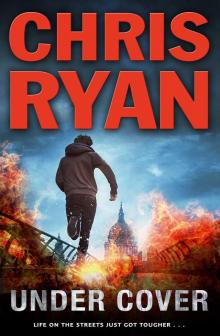 Under Cover (Agent 21)
Under Cover (Agent 21)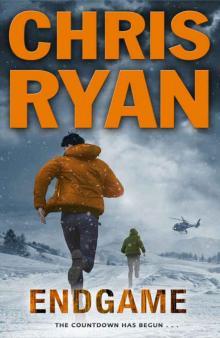 Endgame (Agent 21)
Endgame (Agent 21) Red Centre
Red Centre Blackout
Blackout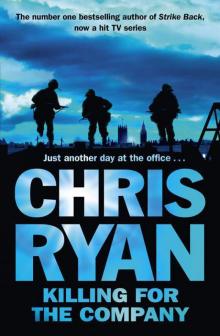 Killing for the Company
Killing for the Company The Watchman
The Watchman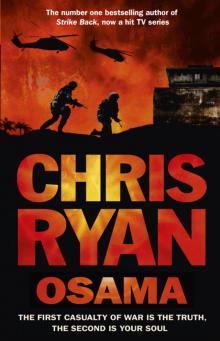 Osama
Osama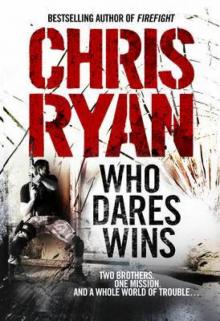 Who Dares Wins
Who Dares Wins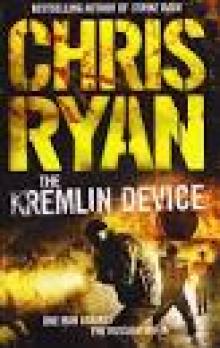 The Kremlin Device
The Kremlin Device Hunter Killer
Hunter Killer Alpha Force: Untouchable
Alpha Force: Untouchable Stand By Stand By
Stand By Stand By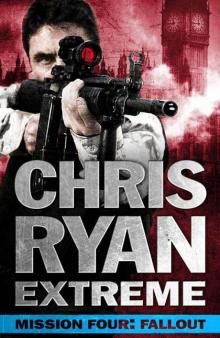 Chris Ryan Extreme: Hard Target: Mission Four: Fallout
Chris Ryan Extreme: Hard Target: Mission Four: Fallout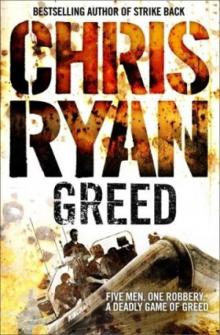 Greed mb-1
Greed mb-1 Alpha Force: Desert Pursuit
Alpha Force: Desert Pursuit Strike Back
Strike Back Greed
Greed The Bay Bulls Standoff
The Bay Bulls Standoff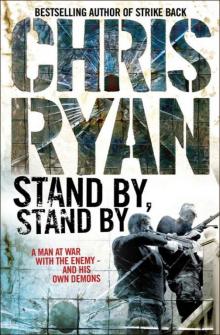 Stand By, Stand By gs-1
Stand By, Stand By gs-1 Outbreak
Outbreak Hunted
Hunted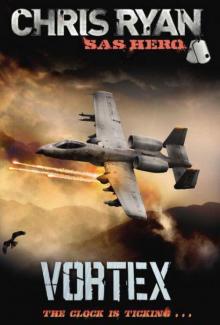 Vortex cr-4
Vortex cr-4 Rat-Catcher
Rat-Catcher Vortex
Vortex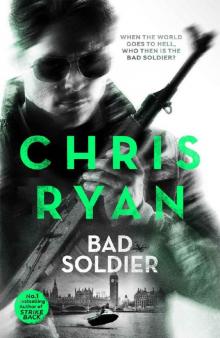 Bad Soldier
Bad Soldier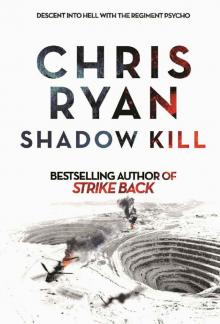 Shadow Kill: A Strikeback Novel
Shadow Kill: A Strikeback Novel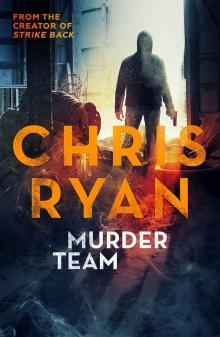 Murder Team (Kindle Single)
Murder Team (Kindle Single) One Good Turn
One Good Turn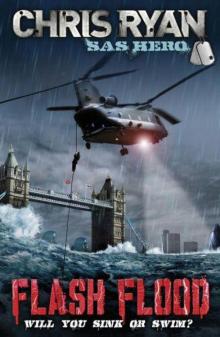 Flash Flood cr-1
Flash Flood cr-1 Night Strike
Night Strike Wildfire
Wildfire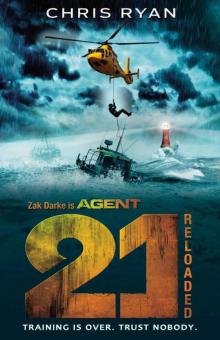 Agent 21: Reloaded: Book 2
Agent 21: Reloaded: Book 2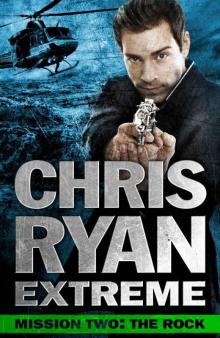 Chris Ryan Extreme: Hard Target: Mission Two: The Rock
Chris Ryan Extreme: Hard Target: Mission Two: The Rock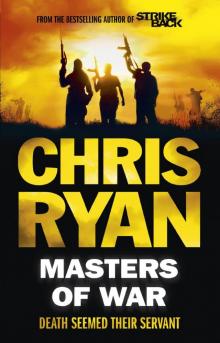 Masters of War
Masters of War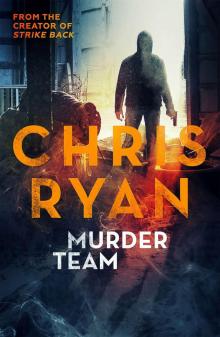 Murder Team
Murder Team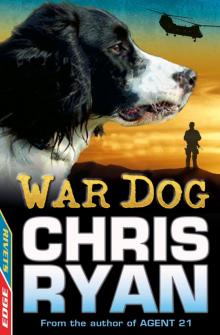 War Dog
War Dog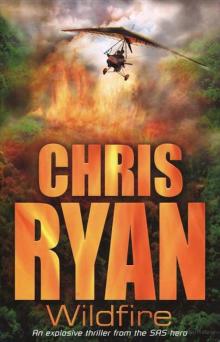 Wildfire cr-2
Wildfire cr-2 Survival
Survival The One That Got Away - Junior edition
The One That Got Away - Junior edition The Hit List
The Hit List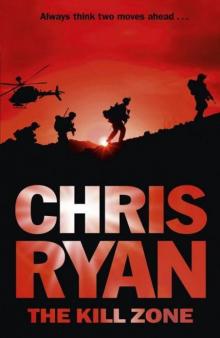 The Kill Zone
The Kill Zone Medal of Honor
Medal of Honor Battleground
Battleground Twister
Twister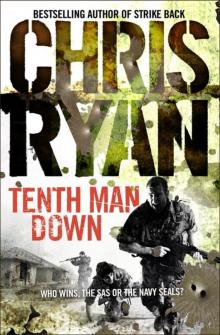 Tenth Man Down gs-4
Tenth Man Down gs-4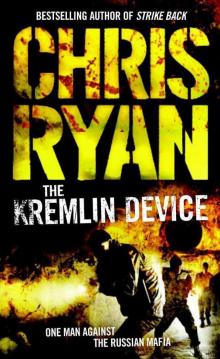 The Kremlin Device gs-3
The Kremlin Device gs-3 Hostage
Hostage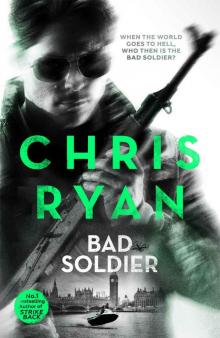 Bad Soldier: Danny Black Thriller 4
Bad Soldier: Danny Black Thriller 4 Alpha Force: Blood Money
Alpha Force: Blood Money Firefight
Firefight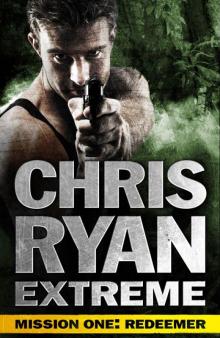 Chris Ryan Extreme: Hard Target: Mission One: Redeemer
Chris Ryan Extreme: Hard Target: Mission One: Redeemer Hit List
Hit List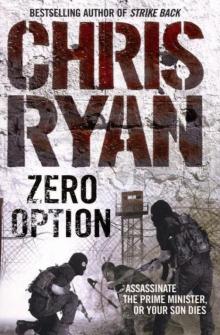 Zero Option gs-2
Zero Option gs-2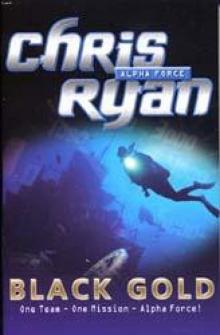 Black Gold
Black Gold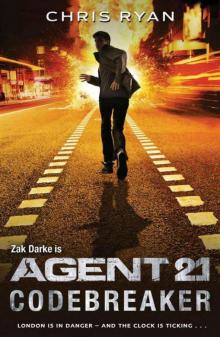 Agent 21: Codebreaker: Book 3
Agent 21: Codebreaker: Book 3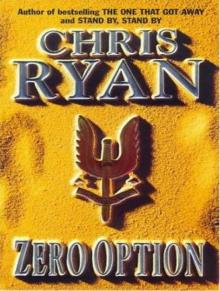 Zero Option
Zero Option Ultimate Weapon
Ultimate Weapon Tenth Man Down
Tenth Man Down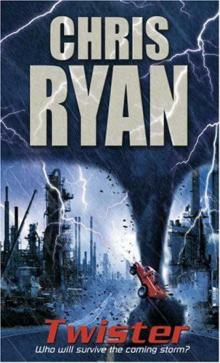 Twister cr-5
Twister cr-5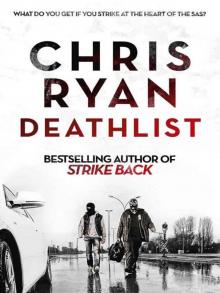 Deathlist
Deathlist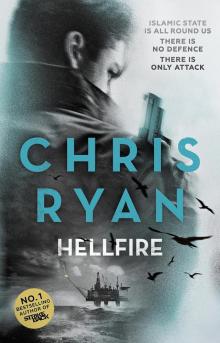 Hellfire
Hellfire Flash Flood
Flash Flood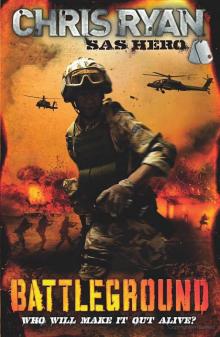 Battleground cr-6
Battleground cr-6 The Increment
The Increment